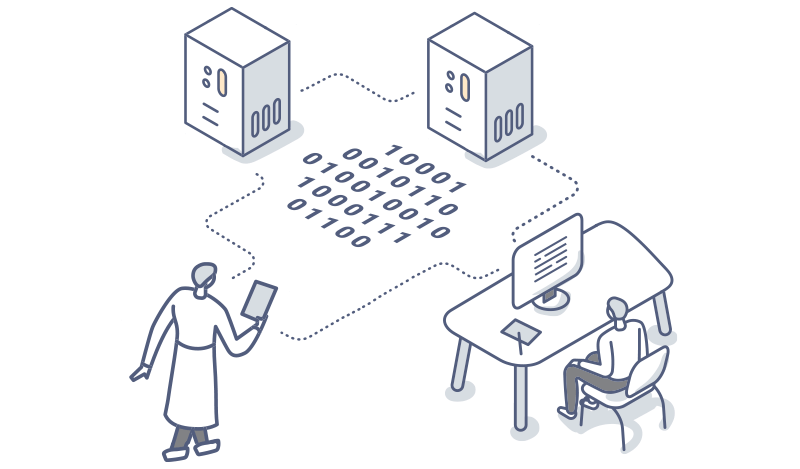APIs in healthcare
Coordinated actions throughout the healthcare community, including government, industry, and advocacy groups drive the continued growth of application programming interfaces, commonly known as “APIs”. ONC’s Cures Act Final Rule and CMS’ Interoperability and Patient Access Final Rule, published in May 2020, outline the special importance of the advancement of APIs in healthcare.
APIs in healthcare allow information systems to communicate and transfer data back and forth from one system to another. For example, a healthcare organization can input a patient’s medical coverage information into a system that works with insurance companies, and instantly determine the patient’s coverage for a specific medication or procedure. This is enabled by an API. The best healthcare APIs allow systems to send or receive data that can update a patient's record or provide collective data used for healthcare analytics.
The history of APIs in healthcare
Prior to electronic health record systems (EHRs), interoperability was left up to phone calls and fax machines. Today, healthcare organizations may be using one EHR in the office, a separate EHR in the hospital, and a specialist may even be using a third. The patient's crucial clinical data often becomes disconnected and spread across a multitude of data silos, fragmenting the full record of the patient’s encounter.
As the evolution to value-based care reimbursement models becomes increasingly affixed to improved health outcomes and reduced readmissions, every healthcare organization will want healthcare analytics that give a full picture of the patient story. For that, the industry needs more robust interoperability standards and healthcare interoperability companies to develop healthcare APIs that address the industry’s need to coordinate care for patients across an increasingly large healthcare landscape better than it currently does.
The rise of APIs in healthcare
The FHIR API framework is a common language that healthcare interoperability companies can use to facilitate more meaningful exchanges between systems. The best healthcare APIs represent a framework for solving complex clinical problems. For example, APIs are being deployed within specialized software platforms to create a centralized, longitudinal view of the patient with the help of artificial intelligence in healthcare.
APIs in healthcare should most ideally have a standardization at an API level. Apps using the best healthcare APIs should be able to get data from any other app through a known standard protocol. In turn, obsolete formats like HL7 will be sunsetted, reducing development costs.
The future of APIs and interoperability
Business cases for next-generation data exchange are driving the future of APIs in healthcare. FHIR is expected to work toward a fully backward compatible standard, while the industry at large pressures healthcare interoperability companies to adopt a standardized implementation model.
APIs in healthcare will allow patients to shift from one service to another, easily transferring data along with them, allowing patients and doctors to get more insight than ever before. Using the latest healthcare apps providers will be able to perfect care based on data being collected and shared from the best healthcare APIs.
Without adhering to data standards the healthcare industry cannot optimize interoperability. Standardized data results in an easy to process and use, connected data set. This data should bring a new level of insight and opportunity into the needs of patients, providers, and payers, which can help the industry make more informed decisions. The data from APIs in healthcare can then guide the industry to standardize new data points, and influence policies that lead and regulate the healthcare industry.
Healthcare APIs have a bright future especially as the data exchange rules of the 21st Century Cures Act encourage their standardization and proliferation across healthcare interoperability companies. In the years to come, look for the expansion of APIs in healthcare to connect providers to more complete data, improve patient outcomes, and enable the public better access to their healthcare records.
ForeSee Medical
We’ve adopted the integration and interoperability standards used by the overwhelming majority of major EHR systems. Choose your device, and our cloud-based HCC risk adjustment coding advice is where you want it, when you need it.


